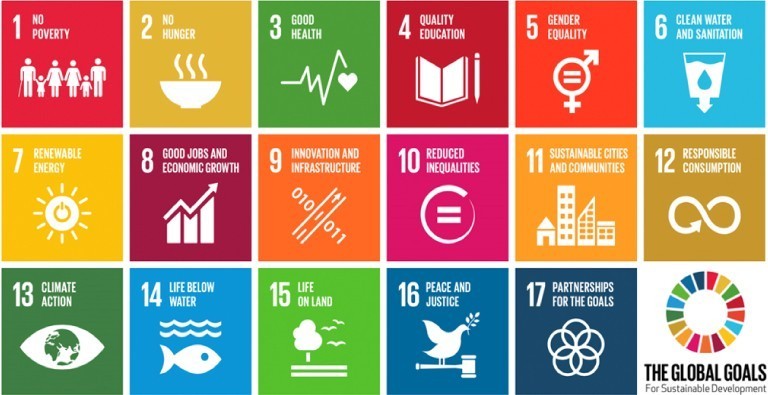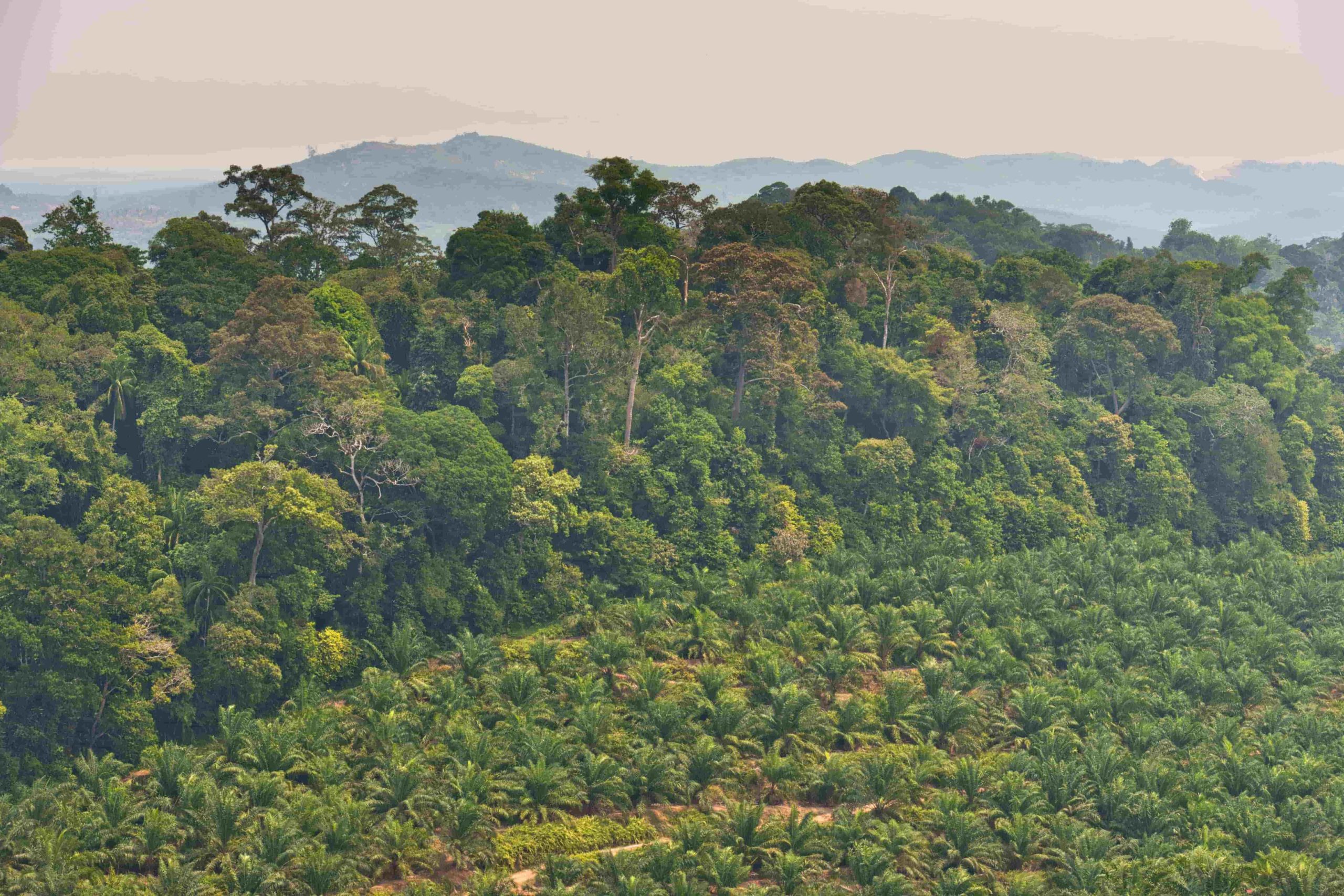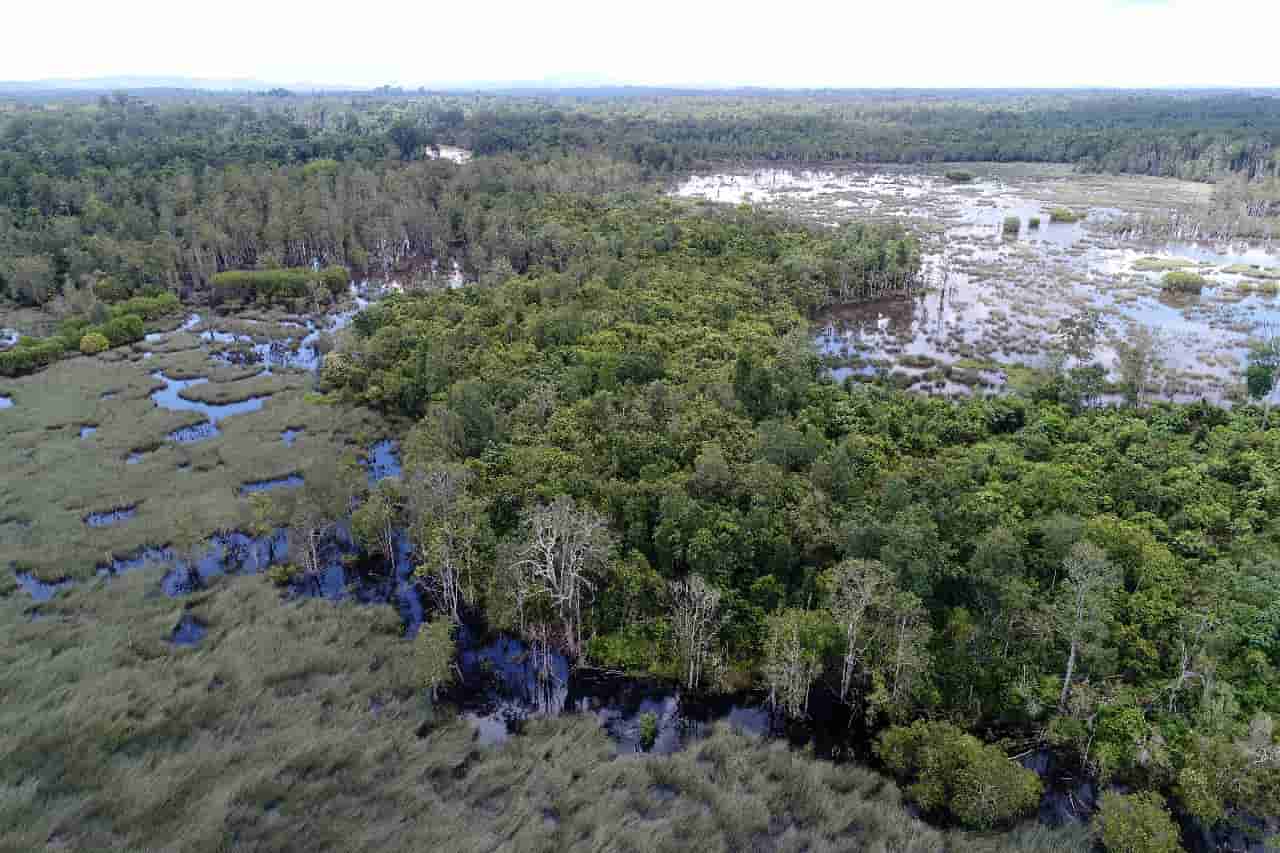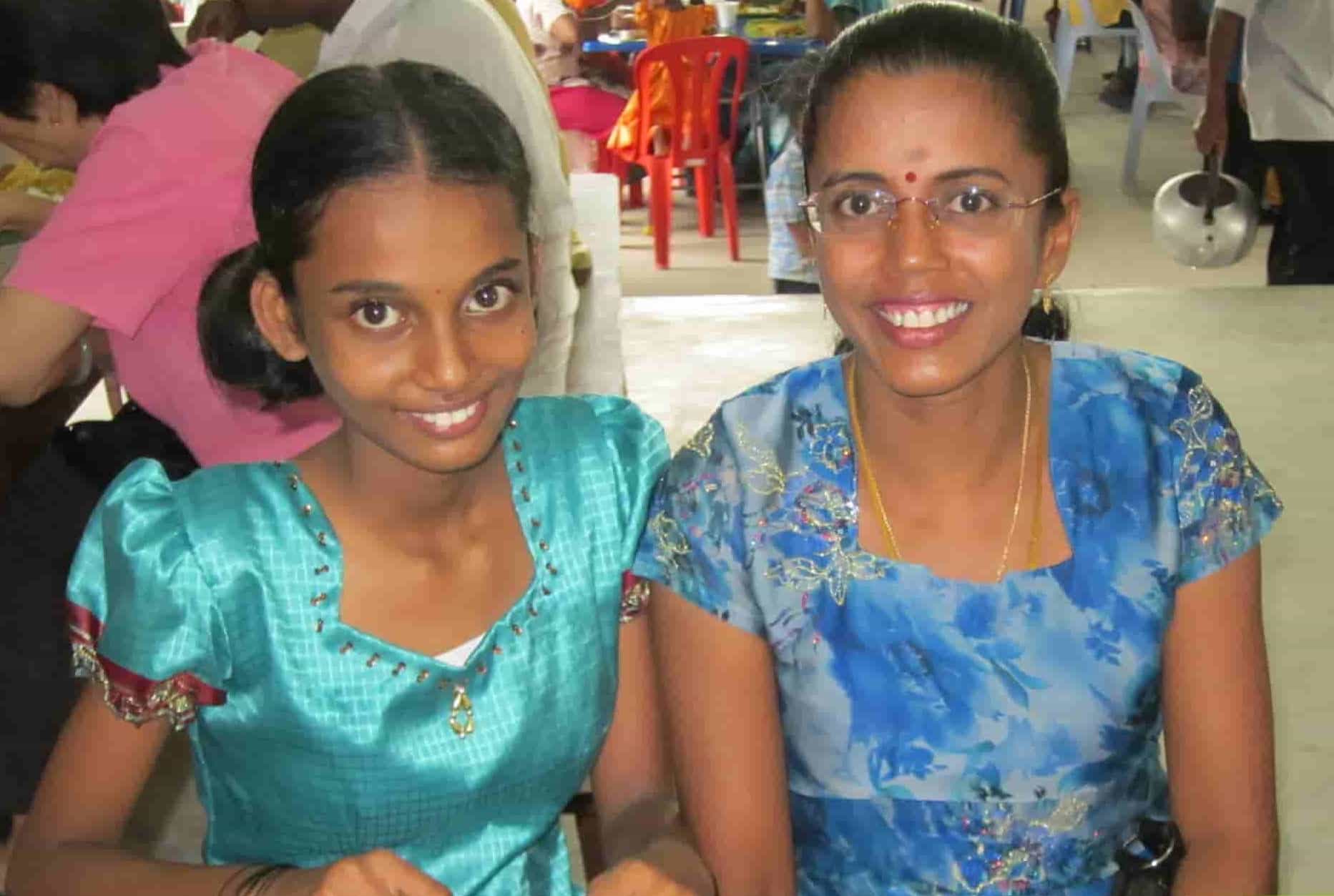BEST MANAGEMENT PRACTICES
Over the past century, United Plantations Berhad has spearheaded the way towards sustainable palm
oil of high quality. Our dedication to sustainable palm oil growth is shown in our implementation of
best management practices, targeted at preventing or reducing any form of pollution whilst at the
same time focusing on productivity and production efficiencies. We embrace the latest innovations
and strive to remain as a leader within sustainable palm oil production.
Conservation and Partnership
Efforts were undertaken by the UP Group to conserve jungle reserves and wildlife sanctuaries as well as
promoting green corridors as part of our commitment to the environment
Adjacent Protected and Conservation Areas
Our Kumai Estate in PTSSS is approximately 2km away from the famous Tanjung Putting National
the park which is known to have a large diversity of forest ecosystems, including lowland forest,
freshwater swamp forest, tropical heath forest which is called “Kerangas”, peat swamp forest,
mangrove forest and coastal forest.
Tanjung Puting was originally declared as a game reserve in 1935 and a National Park in 1982. It
covers a total area of 415,040 hectares. The best-known animals in Tanjung Puting are the orangutans,
made famous through the long term efforts of the Orangutan Research and Conservation Program
(predecessor to OFI), based at the landmark camp Leakey research station.
Endangered and Protected Species
UP has a policy of “zero tolerance” to the killing of endangered and protected species, herein also
orang-utan, Pongo pygmaeus. The staff that is directly or indirectly involved with the killing of and/or
solicitation of killing, trading, and harvesting of endangered and protected species, be it plants or
animals will be dismissed immediately. To the best of our knowledge, illegal killing and capture of
orang-utans has not taken place at any of the properties under the legal management /jurisdiction of
UP.
Biodiversity and Partnership
Conservation of jungle reserves and wildlife sanctuaries as well as promoting green corridors are
examples of our commitment to the environment. To date, United Plantations has set aside more than
7,500 Ha of land for conservation purposes representing approximately 15% of our total planted area
in order to encourage biodiversity and wildlife on our estate. In Indonesia, UP has set approximately
40% of its land concession for the purpose of conservation.
Riparian reserves are maintained to preserve flora and fauna, provide wildlife corridors, ensure water
quality, and prevent erosion. In order to develop effective conservation strategies, we need the
assistance of experts in these fields who have established a series of collaborations and partnerships.
One such partner is the Copenhagen Zoo (CPH Zoo) which was initiated in 2007 and officially
established on 1 October 2010, through a Memorandum of Understanding (MOU) between UP and
CPH.
In order to better manage our large conservation areas, UP set up its Biodiversity Department (BioD)
under the purview of Dr. Carl Traeholt, our Group’s Chief Environmental Advisor a month later. It
marked an important milestone for the Company’s target of producing certified sustainable palm oil in
Indonesia and being able to document the environmental integrity of its Indonesian operations.
The Biodiversity team consists of a Division manager with solid natural resources management
experiences, supported by five subject specialists and five field staff. This is supplemented by
additional contract-workers when the need arises. The team is responsible for mainstreaming
environmental concerns into standard operational procedures and focus on activities primarily within
the following areas:
• Biodiversity (Fauna and Flora)
• Habitat and Ecosystem
• Forestry and rehabilitation
• Hydrology and Limnology
• GIS and Mapping
• Integrated Pest Management
• RSPO and ISPO
• Protection and Monitoring
• Community Outreach
Biodiversity Department
The completion of the BioD office took place in a very short period of time and this remarkable
achievement is a testament to the hard work and commitment by all involved.
The new BioD office was laid as part of the Lada Estate field office and was officially opened in
September 2011, when the BioD made a short presentation to Her Royal Highness Princess Benedikte
of Denmark, UP's senior management, Copenhagen Zoo's vice-director, Mr. Bengt Holst and other
prominent guests at the new auditorium.
One of the key components in making the BioD a success which is our common goal was to develop
internal capacity to manage and conserve UP’s ecological resources, and to make first-hand
information about biodiversity assets easily available. This is possible with the current BioD
consisting of Dr. Carl Traeholt, our Group’s Chief Environmental Advisor, Mr. Bjorn Dahlen,
Environmental Advisor. Mr. Muhd Silmi, Manager BioD, and essential topic specialists, such as a
limnologist, a forester/botanist, zoologist, herpetologist, and database officer. These subjects’
specialists are supported by two chief rangers and a number of ranger assistants, as well as a native
tree nursery manager.
Over the years since the establishment, this Department has undertaken an impressive amount of
activities in support of the company’s commitment to producing sustainable palm oil. In the past,
many exciting activities and accomplishments have been reported. For example, the Biodiversity
The division has worked with leopard cats, Prionailurus bengalensis, as a predator of rats to replace the
environmentally detrimental chemical control.
The work with the sumantran cobra (Naja Sumatrana) and king cobra (Ophiophagus Hannah), the
world’s largest venomous snake has not only produced some amazing results. It has attracted one of
the World’s best known and respected herpetologists, Romolus Whitaker, who continues to grace
UP/PTSSS in Kalimantan and offer support and capacity building every year. The Biodiversity
The division has also undertaken numerous camera trap surveys, bird, and tree surveys to document the
biodiversity within the company’s conservation areas. The BioD has recorded many of Borneo’s
endangered species to date, among them Asia’s only great ape, the orangutan, Pongo pygmaeus.
While these are exciting and inspiring stories about exotic species, the BioD is about far more than
that. An entire host of other activities commenced right from the modest beginning in 2011, including
developing a GIS database that incorporates literally all the team’s recorded data, ne it from camera
trap pictures, radio-tracking locations, number of tree seeds collected, time and place of illegal
logging to the recovery of aquatic fauna. Most of these stories are rarely told, however, some of these will
be revealed in the following.
Indonesian Sustainable Palm Oil (ISPO) Certification
The Indonesian Government established a mandatory certification scheme in 2011, namely the Indonesian Sustainable Palm Oil Principles & Criteria (ISPO) to ensure that all producers within a few years will have to live up to certain standards when operating in Indonesia.
We are pleased to announce that we have successfully obtained the ISPO initial certificate for the entire HGU* area of 6717.62ha in August 2019 and subsequent Annual Surveillance Audits are ongoing.
*HGU refers to the certificate on land cultivation rights title issued by the Government of Indonesia.
Sustainable Palm Oil Transparency Toolkit (SPOTT) Assessments
UP participates in the Sustainable Palm Oil Transparency Toolkit (SPOTT) assessment conducted by Zoological Society of London (ZSL). SPOTT is designed to measure the transparency of Companies in public disclosures of best practices and sustainability commitments via the RSPO Annual Communication of progress (ACOP), RSPO New Planting Procedures (NPP) Public Notification, Company Annual/Sustainability Report and Company Websites.
The key objectives of the SPOTT assessment is to promote industry transparency and accountability to drive the uptake and implementation of environmental and social best practices in high biodiversity impact sectors. United Plantations Berhad maintains an active engagement and commits to collaborate with the Zoological Society of London (ZSL) in the progress towards improving sustainability reporting and enhancing a greater transparency. Our current status on SPOTT assessment as of October 2019 is 84.4% resulting in UP being ranked as number 3 amongst the 99 assessed Global Oil Palm Producers and Traders.
For further details on SPOTT assessment for palm oil companies, please refer here
UP and United Nations Sustainable Development Goals
The SDGs are unique as the goals and targets cover all of the key issues affecting us. They reaffirm our international commitment to end poverty, permanently, everywhere. They are ambitious in making sure no one is left behind. More importantly, they involve us all to build a more sustainable, safer, more prosperous planet for all of humanity.

United Plantations Berhad supports the United Nations Sustainable Development Goals (UN SGDs)
As a company with global operations, UP respects and recognises the importance of its role in this global initiative. As such, the Group has mapped the relevant SDGs with each materiality topic and identified eight (8) UN SDGs with their specific targets that are most relevant to its business operations as well as key concerned materiality topic highlighted by the stakeholders as follows:
| SDGs | Specified Targets | Status | Action Plan |
SDG 1 –No Poverty |
1.1 – By 2030, eradicate extreme poverty for all people everywhere, currently measured as people living on less than $1.25 a day | Ongoing | All employees of UP in Malaysia receive at least the minimum wage set by the Malaysian Government (Minimum Wages Order 2018), RM1,100/- per month with effect from 1st January 2019. The average earnings in United Plantations was 50 % higher from the current minimum wage. |
| Accommodation is provided free of charge to all workers with potable water supply and electricity at a subsidized rate. | |||
| UP provides annual benevolent payments as well as other compassionate and educational payments/scholarships to the workers via the UP Benevolent Fund. The Benevolent Retirement Scheme was established in 1985 to provide retirement benefits to workers who have loyally served the Group for 10 years and above. | |||
| UP helps smallholders to develop their land, including land preparation, for cultivation of oil palms under the Plasma Scheme. The scheme is expected to provide more opportunities for the smallholders and help alleviate poverty. | |||
SDG 2 –No Hunger |
2.1 – By 2030, end hunger and ensure access by all people, in particular the poor and people in vulnerable situations, including infants, to safe, nutritious and sufficient food all year round. | Ongoing | The Company facilitates the purchase of rice and sugar at wholesale price for its employees. Cooking oil is supplied to the general employees at a subsidized rate. |
| The orchards with local fruit trees are established in estates for employees and residents’ consumption. The Company also plants coconut palms and fruit trees around the workers quarters for their access and use. Residents are encouraged to plant vegetables in their backyard. | |||
| UP established the Old Folks Home in 1967. The Home caters for the retired and aged employees who are given free boarding, food and medical care with a full-time caregiver. | |||
SDG 3 –Good Health |
3.8 – Achieve universal health coverage, including financial risk protection, access to quality essential healthcare services and access to safe, effective, quality and affordable essential medicines and vaccines for all. | Ongoing | There are two (2) Group Hospitals and eight (8) clinics in UP Group with full-time certified Hospital Assistants (HA) and ambulance services. In addition, there are regular visits by the Visiting Medical Officers (VMO) cum Occupational Health Doctor (OHD). |
| Medicines and treatments are provided free of charge to all employees and their dependents as well as the neighbouring communities. | |||
| 3.9 – By 2030, substantially reduce the number of deaths and illnesses from hazardous chemicals and air, water and soil pollution and contamination. | Ongoing | In line with our Company OSH Policy, we are committed to secure the safety and health of our employees at work. Nevertheless, we strive to maintain a safe and healthy working environment for our employees, customers and the public. | |
| Appropriate Personal Protective Equipment (PPE) are provided free of charge to the employees. | |||
| Training on Safe Operating Procedures (SOP) and Hazards Identification, Risk Assessment and Risk Control (HIRARC) are conducted on a regular basis. | |||
| Regular safety audits are conducted by the Company’s Resident Safety Officer to identify any risks, safety non-conformances which are subsequently addressed by the management units. | |||
| Potable water supply is provided to all employees and their dependents on the estates. Domestic water sample analysis conducted by accredited laboratories on a regular basis. | |||
| The implementation of chemical measurement and transfer method by using a new Anabranch Liquid Handling System significantly reduces the exposure of chemicals to the chemical mixing operators as well as reducing the soil and waterways contamination during pouring and transferring of chemicals. | |||
SDG 7 – Renewable Energy |
7.2 – Increase substantially the share of renewable energy in the global energy mix. | Ongoing | All mills in UP Group are equipped with Biogas plants which capture the methane gas produced when palm oil effluents are biodegraded by an array of bacteria thereby producing green energy. This considerably mitigates the Greenhouse Gas (GHG) emissions reducing the impact on climate change. Furthermore, the Electrification Project in one of our mills enables the conversion of biogas to electricity that is exported back to the national grid thereby displacing the need to burn coal. |
| The state-of the-art new refinery, Unifuji utilises renewable energy derived from Biomass generated from the newly established neighbouring Optimill which creates a “circular economy” and best practice within the industry. This complex now operates without the use of fossil fuels significantly reducing the GHG footprint of the Groups operations. | |||
SDG 8 –Good job and economic growth |
8.2 – Achieve higher levels of economic productivity through diversification, technological upgrading and innovation, including through a focus on high-value added and labour-intensive sectors. | Ongoing | The opening of the new Optimill factory complex and Unifuji not only produces value added palm fractions but also provides employment opportunities for 150 people. |
| The average earning of workers is 50% higher than the minimum wages based on their productivity. | |||
| 8.8 – Protect labour rights and promote safe and secure working environments for all workers, including migrant workers, and those in precarious employment. | Ongoing | UP Group is committed to the protection and advancement of human rights wherever we operate. Our human rights policy is based on our core values on Safety and Health, Environmental Stewardship and Respect for people. | |
SDG 9 – Innovation and Infrastructure |
9.4 – By 2030, upgrade infrastructure and retrofit industries to make them sustainable, with increased resource-use efficiency and greater adoption of clean and environmentally sound technologies and industrial processes, with all countries taking action in accordance with their respective capabilities. | Ongoing | UP encompasses and amalgamates the most modern equipment and technologies available in the industry embracing the concept of the circular economy. This can be demonstrated through the Company’s investment in the new Optimill and a new joint venture refinery called UniFuji. |
| The VORSEP Dust Collector System has been installed in all of our mills where the dust emissions have been successfully reduced to the level far below permissible level by Department of Environment (DOE). | |||
SDG 13 – Climate Action |
13.2 – Integrate climate change measures into national policies, strategies and planning. | Ongoing | By creating a greater environmental awareness and by mapping out areas that contribute negatively towards greenhouse gas emissions the UP Group has through been able to make specific and target orientated green investments that has contributed towards reducing its GHG emissions by 43% (1.86 kg CO2e/kg NBD oil in 2019) compared to 2004 levels (3.25kg CO2e/kg NBD oil) with iLUC and nature conservation. |
| Nature tree reserves parks including the Group’s 7,500Ha of jungle conservation area that has been permanently set aside. UP has effectively cancelled out the negative impact of iLUC on our GHG emissions. | |||
| Throughout the years, additional railway tracks were laid to facilitate crop transportation bringing the total network length to about 540km. The in-house fabricated 90hp diesel locomotives can efficiently transport up to 180 MT of crop in a single trip, compared to an average 6 tonne payload capacity when using trucks or tractor-trailers. This superior efficiency offers substantial fossil fuel savings and mitigation of GHG emissions. | |||
| Most of the oil palm residues including chipped trunks, fronds, EFB, fibre and shells are effectively utilised and recycled as organic matter back to the fields, in the form of organic mulch in the nursery thereby enriching our soils or as a fuel source displacing the use of fossil fuels whilst adding value to the biomass generated. To further enhance our biomass utilisation, 8 new Biomass Reciprocating Boilers have been built since 2005. | |||
SDG 17 – Partnership for the Goals |
17.16 – Enhance the Global Partnership for Sustainable Development, complemented by multi-stakeholder partnership that mobilize and share knowledge, expertise, technology and financial resources, to support the achievement of the Sustainable Development Goals in all countries, in particular developing countries. | Ongoing | UP and Fuji Oil agreed to establish a Joint Venture (JV) based on a common goal of a long-term partnership in which unique technologies, sustainable practices and first-class palm oil quality are combined.
This JV has materialised into a super modern and efficient setup including a solvent fractionation plant. |
| UP collaborates with Copenhagen Zoo in conducting research on leopard cats, King Cobra, the cultivation and planting of endangered tree species, restoration and rehabilitation initiatives as well as biodiversity conservation. This collaboration was initiated in 2007 and officially established on 1 October 2010, through a Memorandum of Understanding (MOU). |
Adherence to No Deforestation, No New Development on Peat and No Exploitation of People and Local Communities (NDPE) Policy
These commitments are incorporated in our Environment and Biodiversity Policy as well as our Human Rights Policy of United Plantations Berhad. We ensure our employees, contractors, suppliers (including direct and independent/third party), trading partners, scheme smallholders (plasma), associated local communities and stakeholders live up to these policies.
The overview of our NDPE commitments are as follows:

No Deforestation
- No development on High Carbon Stock (HCS) Forests and High Conservation Value (HCV) areas.
- We strive to maintain an open and dynamic approach towards continuous improvements in respect of conservation in HCV, HCS areas and reduction of greenhouse gas (GHG) Emissions.
- We ensure No Deforestation and No New Development on Peat within our operations.
- Not to operate or develop within international or nationally designated protected areas
- Open burning is strictly prohibited.
- Capturing, poaching and hunting of native tree species and animals especially Endangered, Rare and Threatened species as per the IUCN Red List are prohibited.

No New Development on Peat
- No new development on peat regardless of its depth since 2010.
- Best Management Practices for existing plantations on peat.
- The management plans are implemented and monitored, which includes but not limited to the following:
- Water Management in Peat Areas
- Weirs for Moisture Conservation
- Monitoring of meteorological parameters using weather stations These provide a large amount of micro-climate information critical to, particularly, make accurate fire-risk predictions.
- Where feasible, explore options for peat restoration by collaborating with the relevant experts.
UP’s role regarding the RSPO remains one of being active and in this connection, we are pleased to state that our Company was one of the initial palm plantations signatories to the RSPO in 2004. Shortly after the establishment of the RSPO, UP was a part of the initial stakeholders group involved in developing the principles and criteria to define sustainable palm oil.

No Exploitation of People and Local Communities
- We adhere to the fundamental elements of International Labour Organization (ILO) Convention and the United Nations Declaration on Human Rights, the Rights of Indigenous Peoples and other core values as ratified by the countries in which we operate.
- We fully respect the rights of our employees, whistleblowers, complainants and community spokespersons including prohibiting retaliation against Human Rights Defenders (HRD) and prohibit intimidation and harassment by our management units and contracted services including contracted security forces.
- Ensure all personnel are being treated fairly and protected from any form of discrimination.
- Ensure equal opportunities are provided to all personnel regardless of religion, race, age, gender, nationality or physical disability.
- Respect the rights of all personnel to form, join and participate in registered trade unions and to bargain collectively.
- Respect the rights of people in communities impacted by our activities.
- Respect land tenure rights as well as recognize duties and responsibilities associated with tenure rights.
- Respect customary or native rights of indigenous and local communities and we commit to Free, Prior and Informed Consent (FPIC) in all negotiations prior to commencing any new operations.
- Resolve all complaints and grievances through an open, transparent and consultative process.
- Support the inclusion of smallholders into the supply chain.
To view our Environment and Biodiversity Policy as well as Human Rights Policy, please click the here



